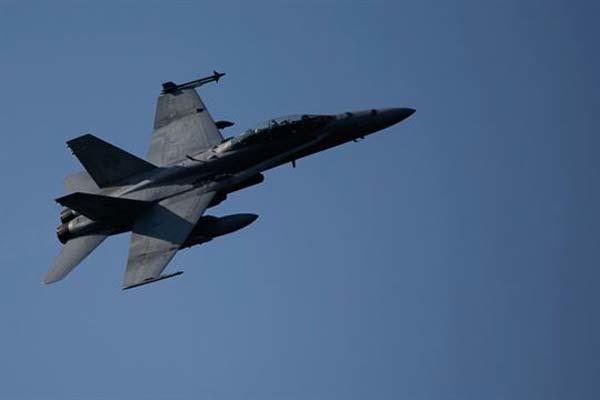Updated 5:14 PM EST
A Marine Corps pilot has been recovered by a search-and-rescue crew after ejecting when two F/A-18 Hornets collided off the coast of San Diego earlier today.
The collision took place today around 11:45 a.m. local time during a training mission over waters near San Diego, California, according to a news release from 3rd Marine Aircraft Wing and Marine Corps Air Station Miramar.
One of the pilots ejected from the aircraft and send up a distress call at about 12:11 p.m., officials said. The pilot was recovered 30 minutes later by search-and-rescue assets from the aircraft carrier Carl Vinson, which is based in San Diego.
The two single-seat aircraft were attached to 3rd MAW, although the squadron has not been identified.
The other pilot landed without incident at nearby Naval Air Station North Island, officials said. Both pilots are in stable condition and have been taken to nearby medical facilities for evaluation, according to the release.
The incident marks the second time in 12 months that two Marine Corps aircraft have collided in flight, and the fourth recent incident involving Marine Corps Hornets.
In January, two CH-53E Super Stallions collided during a night mission off the coast of Oahu, tragically resulting in the deaths of all 12 Marines aboard the aircraft. And between between October 2015 and August of this year, there were three separate F/A-18C Hornet crashes, two of them fatal. All three Hornets were from the same Miramar-based squadron, VMFA-232.
In August, Marine Corps leaders ordered all aviation squadrons to observe a 24-hour “operational pause” within the space of a week to address best practices and ways to improve. Marine Corps Commandant Gen. Robert Neller would later tell Military.com that the pause was intended to address lower-level mishaps, rather than major crashes.
Neller maintained the squadron in question did not have any pressing readiness issues.
The cause of the crash is being investigated, officials said.
-- Hope Hodge Seck can be reached at hope.seck@military.com. Follow her on Twitter at @HopeSeck.
Original Story
A search-and-rescue operation is underway after a mid-air crash of two Marine Corps F/A-18 Hornets that caused one pilot to execute an emergency ejection.
The collision took place today around 11:45 a.m. local time during a training mission over waters near San Diego, California, according to a news release from 3rd Marine Aircraft Wing and Marine Corps Air Station Miramar.
The two single-seat aircraft were attached to 3rd MAW, although the squadron has not been identified. One of the pilots was able to eject safely from the aircraft, officials said. Search and rescue assets are currently en route to recover that pilot; it's not clear how long that mission will take.
The other pilot landed without incident at nearby Naval Air Station North Island, officials said.
The incident marks the second time in 12 months that two Marine Corps aircraft have collided in flight, and the fourth recent incident involving Marine Corps Hornets.
In January, two CH-53E Super Stallions collided during a night mission off the coast of Oahu, tragically resulting in the deaths of all 12 Marines aboard the aircraft. And between between October 2015 and August of this year, there were three separate F/A-18C Hornet crashes, two of them fatal. All three Hornets were from the same Miramar-based squadron, VMFA-232.
In August, Marine Corps leaders ordered all aviation squadrons to observe a 24-hour “operational pause” within the space of a week to address best practices and ways to improve. Marine Corps Commandant Gen. Robert Neller would later tell Military.com that the pause was intended to address lower-level mishaps, rather than major crashes.
Neller maintained the squadron in question did not have any pressing readiness issues.
The cause of the crash is being investigated, officials said.
-- Hope Hodge Seck can be reached at hope.seck@military.com. Follow her on Twitter at @HopeSeck.





























